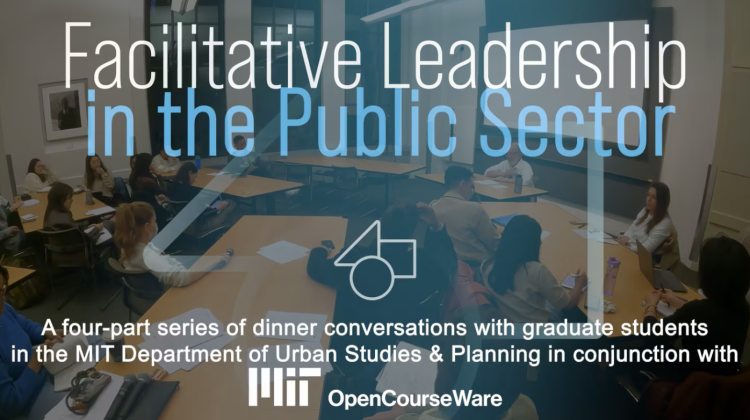Empowering Future Leaders in the Public Sector

Credit: Tom Adams, Reelife Productions
When one thinks of leadership courses at universities, we usually imagine classes taught in business schools by former private sector managers. Such courses aim to pass along the skills necessary to thrive in a top-down leadership role in a private company. In the private sector, organizational charts assign fixed responsibilities, empowering certain individuals with the authority to tell others what to do and how to proceed. In the public sector, though, the responsibilities of leadership are much more diffuse, with complicated lines of authority and overlapping decision making. How can individuals aiming for a career in public service gain the training they need to be effective leaders when private sector leadership models don’t apply?
A new online course, distributed by MIT, called Facilitative Leadership In The Public Sector, seeks to fill the gap. It includes recordings of interactions and discussions among graduate students in the MIT Department of Urban Studies and Planning as they come to grips with the challenges of public sector leadership. In the context of four, 45-minute modules graduate students from all over the world confront hypothetical leadership challenges, determine whether they have the micro-skills they are going to need and talk about their personal definitions of the public good. "I want to give students considering careers in the public sector and learners who see themselves as responsible community leaders, an opportunity to reflect on their personal theories of practice and to consider multiple points of view,” says Lawrence Susskind who designed and taught the course. “I needed to put them into realistic situations, and to press them to share their best thinking on what they would do in a difficult leadership situation and why."
Facilitative Leadership In The Public Sector is taught by Lawrence Susskind, Ford Professor of Urban and Environmental Planning at MIT. He has over 50 years of experience coaching and training urban planners, community activists, and public managers, especially in the theory and practice of multi-party negotiation. He also teaches the tools of public engagement in local decision-making, cybersecurity for critical urban infrastructure, entrepreneurial negotiation, global environmental treaty-making, and strategies for resolving local disputes over proposed renewable energy projects. He offers seven online courses through MITx and MITxPRO, including short-courses that focus on socially-responsible real estate development and Power and Influence in Group Decision-making.
Facilitative Leadership In The Public Sector is available via MIT OpenCourseWare and DUSP Open Learning. This is a recent initiative that aims to bring specialized MIT education in urban, environmental, community and international planning to international audiences at low or no cost. There are already thousands of learners around the world who have completed the Facilitative Leadership in the Public Sector course.


